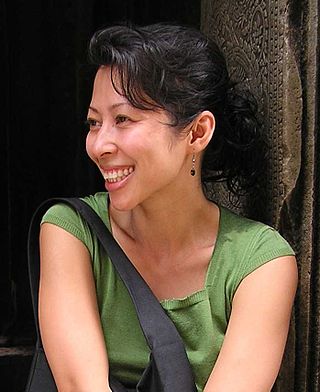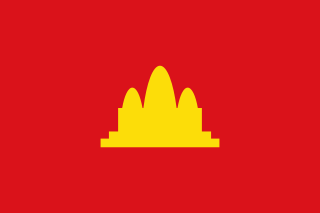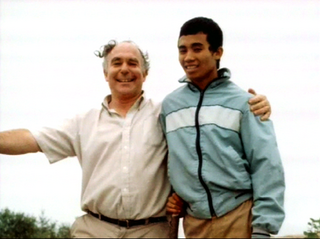
Pol Pot was a Cambodian communist revolutionary, politician and a dictator who ruled Cambodia as Prime Minister of Democratic Kampuchea between 1976 and 1979. Ideologically a communist and a Khmer ethnonationalist, he was a leading member of Cambodia's communist movement, the Khmer Rouge from 1963 to 1997, and served as General Secretary of the Communist Party of Kampuchea from 1963 to 1981. His administration converted Cambodia into a one-party communist state and perpetrated the Cambodian genocide.

The Khmer Republic was a Cambodian state under the United States-backed military dictatorship of Marshal Lon Nol from 1970 to 1975. Its establishment was formally declared on 9 October 1970, following the 18 March 1970 coup d'état which saw the overthrow of Norodom Sihanouk's government and the abolishment of the Cambodian monarchy.

The Cambodian Civil War was a civil war in Cambodia fought between the forces of the Communist Party of Kampuchea against the government forces of the Kingdom of Cambodia and, after October 1970, the Khmer Republic, which had succeeded the kingdom.

Son Sen, alias Comrade Khieu (សមមិត្តខៀវ) or "Brother Number 89", was a Cambodian Communist politician and soldier. A member of the Central Committee of the Communist Party of Kampuchea/Party of Democratic Kampuchea, the Khmer Rouge, from 1974 to 1992, Sen oversaw the Party's security apparatus, including the Santebal secret police and the notorious security prison S-21 at Tuol Sleng.

Ieng Sary was the co-founder and senior member of the Khmer Rouge and one of the main architects of the Cambodian Genocide. He was a member of the Central Committee of the Communist Party of Kampuchea led by Pol Pot and served in the 1975–79 government of Democratic Kampuchea as foreign minister and deputy prime minister. He was known as "Brother Number Three", as he was third in command after Pol Pot and Nuon Chea. His wife, Ieng Thirith, served in the Khmer Rouge government as social affairs minister. Ieng Sary was arrested in 2007 and was charged with crimes against humanity but died of heart failure before the case against him could be brought to a verdict.

The Killing Fields is a 1984 British biographical drama film about the Khmer Rouge regime in Cambodia, which is based on the experiences of two journalists: Cambodian Dith Pran and American Sydney Schanberg. It was directed by Roland Joffé and produced by David Puttnam for his company Goldcrest Films. Sam Waterston stars as Schanberg, Haing S. Ngor as Pran, and John Malkovich as Al Rockoff. The adaptation for the screen was written by Bruce Robinson; the musical score was written by Mike Oldfield and orchestrated by David Bedford.

The Cambodian–Vietnamese War was an armed conflict between Democratic Kampuchea, controlled by Pol Pot's Khmer Rouge, and the Socialist Republic of Vietnam. The war began with repeated attacks by the Liberation Army of Kampuchea on the southwestern border of Vietnam, particularly the Ba Chúc massacre which resulted in the deaths of over 3,000 Vietnamese civilians. On 23 December 1978, 10 out of 19 divisions of Khmer Rouge's military divisions opened fire along the shared Southwestern borderline with Vietnam with the goal of invading the Vietnamese provinces of Đồng Tháp, An Giang and Kiên Giang. On 25 December 1978, Vietnam launched a full-scale invasion of Kampuchea, and subsequently occupied the country in 2 weeks and removed the government of the Communist Party of Kampuchea from power. In doing so, Vietnam put an ultimate stop to the Cambodian Genocide, which had most likely killed between 1.2 million and 2.8 million people — or between 13 and 30 percent of the country’s population.

Loung Ung is a Cambodian-American human-rights activist, lecturer and national spokesperson for the Campaign for a Landmine-Free World from 1997 to 2003. She has served in the same capacity for the International Campaign to Ban Landmines, which is affiliated with the Vietnam Veterans of America Foundation.

Democratic Kampuchea was the Cambodian state from 1975 to 1979, under the totalitarian dictatorship of Pol Pot and the Communist Party of Kampuchea (CPK), commonly known as the Khmer Rouge. It was established following the Khmer Rouge's capture of the capital Phnom Penh, effectively ending the United States-backed Khmer Republic of Lon Nol. After Vietnam took Phnom Penh in 1979, it was disestablished in 1982 with the creation of the CGDK in its place.

The Reverend Peter Lawrence Pond (1933–2000) was a New England clergyman, activist and philanthropist who worked with Cambodian orphans on the Thai-Cambodian border. He was executive director of the Providence-based Cambodian Crisis Committee and was a co-founder of the Thai Friends Relief Foundation as well as the Inter-Religious Mission for Peace in Cambodia.

Cambodia–Vietnam relations take place in the form of bilateral relations between the Kingdom of Cambodia and the Socialist Republic of Vietnam. The countries have shared a land border for the last 1,000 years and share more recent historical links through being part of the French colonial empire. Both countries are members of the Association of Southeast Asian Nations (ASEAN).

PrinceNorodom Chantaraingsey was a member of the Cambodian royal family and a Cambodian nationalist. Initially a leader of the guerrilla resistance against the colonial French, he went on to become a prominent general in the Khmer National Armed Forces (FANK) during the Cambodian Civil War, as well as a businessman and occasional writer.
Sa Kaeo Refugee Camp was the first organized refugee relief camp established on the Thai-Cambodian border. It was built by the Royal Thai Government with support from international relief agencies including the United Nations. It opened in October 1979 and closed in early-July 1980. At its peak the population exceeded 30,000 refugees; no formal census was ever conducted.
Alive in the Killing Fields is the memoir of Nawuth Keat, a survivor of the Khmer Rouge genocide in Cambodia. The book was published in 2009 by National Geographic.

Cambodian genocide denial is the belief expressed by some Western academics that early claims of atrocities committed by the Khmer Rouge government (1975–1979) in Cambodia were much exaggerated. Many scholars of Cambodia and intellectuals opposed to the US involvement in the Vietnam War denied or minimized reports of human rights abuses of the Khmer Rouge, characterizing contrary reports as "tales told by refugees" and US propaganda. They viewed the assumption of power by the Communist Party of Kampuchea as a positive development for the people of Cambodia who had been severely impacted by the Vietnam War and the Cambodian Civil War. On the other side of the argument, anti-communists in the United States and elsewhere saw in the rule of the Khmer Rouge vindication of their belief that the victory of Communist governments in Southeast Asia would lead to a "bloodbath."
The Cambodian humanitarian crisis from 1969 to 1993 consisted of a series of related events which resulted in the death, displacement, or resettlement abroad of millions of Cambodians.

First They Killed My Father is a 2017 Cambodian–American Khmer-language biographical historical thriller film directed by Angelina Jolie and written by Jolie and Loung Ung. The film is based on Ung's eponymous memoir. Set in 1975, the film depicts 5-year-old Loung, who is forced to train as a child soldier while her siblings are sent to labor camps during the Khmer Rouge regime.
Fortunes of War is a 1994 Direct-to-video action film filmed in the Philippines directed by Thierry Notz that was produced by as well as starring Matt Salinger.
Uth Roeun is a Cambodian cartoonist responsible for the first Cambodian comic book in 1964. He is a key figure in the "golden age" of Cambodian comics prior to the Khmer Rouge regime.

The Dangrek genocide, also known as the Preah Vihear pushback, is a border incident which took place along the Dangrek Mountain Range on the Thai-Cambodian border which resulted in the death of many mostly Sino-Khmer refugees who were refused asylum by the Kingdom of Thailand in June 1979.















